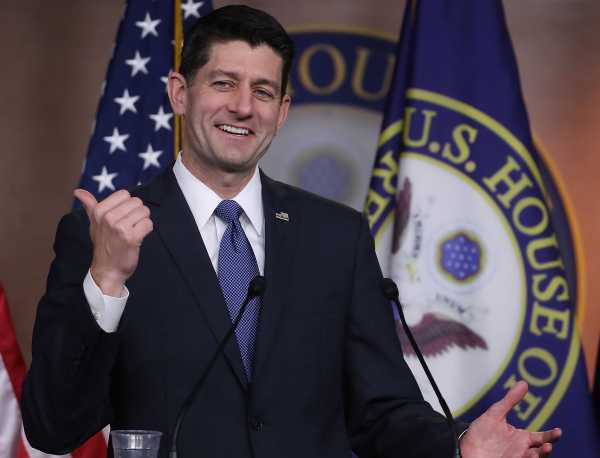
It’s been six months since President Donald Trump signed into law the Republican tax cuts. During that time, the measure appears to have become less popular — not more. The GOP’s big 2018 midterms sales pitch isn’t working out exactly how party leaders thought it would.
According to a Monmouth University poll released this week, just 34 percent of Americans said they approve of the Republican tax reform package, compared to 41 percent who disapprove. That’s down from April, when 40 percent of Americans said they approved of the law and 44 percent did not. In January, respondents were evenly split, with 44 percent saying they approved and another 44 percent voicing disapproval of the plan.
Public opinion on the tax law has “never been positive,” said Patrick Murray, director of the Monmouth University Polling Institute, in a statement accompanying the results, “but potentially growing uncertainty about how American taxpayers will be affected does not seem to be helping the GOP’s prospects in November.”
Broadly, most polling shows the tax law is more disliked than liked by Americans. A recent Quinnipiac poll found 39 percent of respondents approve of the legislation and 46 percent disapprove of it. An Economist/YouGov poll found a smaller but still negative margin, with 38 percent approving and 40 percent not.
A RealClearPolitics average of tax law polling indicates that about 36.1 percent of Americans are on board with the tax measure and 43 percent are not, a nearly 7 percentage point difference.
Americans seem kind of ambivalent about the tax law
It appears that more Americans are becoming uncertain about how they feel about the tax legislation, the Monmouth pollsters noted. Twenty-four percent of respondents to their June poll said they’re not sure how they feel about the law. In January, 13 percent said they didn’t know.
That could be for a lot of reasons. The law is designed to benefit corporations and the richest Americans most. It reduced the corporate tax rate from 35 percent to 21 percent, and the top 1 percent of individual earners are expected to receive about 80 percent of the legislation’s gains.
Many Americans are probably seeing somewhat higher paychecks but not enough for them to notice. There’s polling to back that up: In February, just a quarter of the public reported seeing a change in their paychecks in a Politico/Morning Consult poll. And the real proof in the pudding won’t be evident until tax time in April 2019.
“When they’ll really see the difference is a year from March and April,” said Marc Goldwein, senior policy director for the bipartisan Committee for a Responsible Federal Budget, told Vox’s Ella Nilsen in April.
While ordinary Americans may not be feeling the law in their lives, corporate America and Wall Street certainly are: Corporate stock buybacks are booming this year, thanks in part to the tax cuts. Companies such as Apple, Cisco, Pepsi, Wells Fargo, and Harley-Davidson have announced major stock repurchase plans this year. And that’s not always translating into a positive impact on their workers: Wells Fargo has been laying off workers, and Harley-Davidson is closing its Kansas City plant.
Sourse: breakingnews.ie
0.00 (0%) 0 votes


































